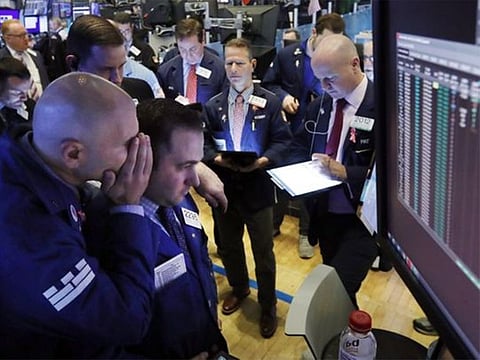Fears of extreme volatility, market speculation grip investors
Uncertainty jumps, high volatility threatens to create rapid, severe losses for investors

Dubai: While investors brace for a busy week ahead, with plenty of corporate and economic news to digest, uncertainty spiked in stock markets over worries of extreme asset valuations and speculations.
Global stocks came under pressure last week with another volatile session Friday as the buying frenzy over a video game retailer and some other stocks resumed amid stepped-up scrutiny from regulators.
Millions of small investors and day traders united to drive up the share prices of video-game store chain GameStop and others such as cinema chain AMC, diverting and pocketing money from hedge funds who had been betting against the stock.
Extreme stock price volatility
With GameStop shares soaring 1,700 per cent and AMC up around 470 per cent for the month, losses for hedge funds and other short-sellers catapulted to around $19 billion in the year so far.
Moreover, the US Securities and Exchange Commission (SEC) warned Thursday that “extreme stock price volatility” has the potential to cause “rapid and severe losses” for investors and to undermine market confidence.
Major US indices fell about 2 per cent following similar drops in Europe and Asia, while investors weighed some positive developments on vaccines in the US, and a slower rollout of vaccines in Europe.
More economic data to come in
On the economic front, US manufacturing data (PMIs), non-farm payrolls, China PMIs and decisions from the central banks of Australia and the UK will all keep traders on their toes this week, noted Chris Beauchamp, chief market analyst at UK-based online trading platform IG.
While the ISM manufacturing index – a key monthly indicator of economic activity – is based on a survey of purchasing managers at manufacturing firms, nonfarm payrolls is the measure of the number of workers in the US excluding farm workers and workers in few other job classifications.
Meanwhile, corporate earnings come through from a variety of sectors worldwide, with markets expected to closely monitor results from popular names like Alphabet, Amazon, oil majors BP, Shell, Exxon and ConocoPhillips, and conglomerate Unilever, BT (formerly British Telecom) and Vodafone.
Concerns of market ‘bubble’ spike
Unwarranted rises in stock prices are fuelling concerns that markets are currently in a bubble state amid mounting evidence of extreme market speculation and in light of unreasonable price surges of assets like Bitcoin and others unprofitable stocks.
While the shares of Airbnb, DoorDash and other start-ups have gone straight up on their first day of trading, there have also been instances wherein shell companies with no operating assets have raised money due to what is known as the SPAC (special purpose acquisition companies) mania.
Many companies are all going or have gone public through SPACs, which were once reserved for the back waters of Wall Street. SPACs raised $16 billion during the first three weeks of 2021, surpassing the $13 billion raised in 2019, according to Goldman Sachs. In 2020, 229 SPACs raised $76 billion.
“Bubble-like sentiment surrounds SPACs,” Goldman Sachs analysts said in a recent research report.
Speculations driving surges
Apart from Bitcoin, which rose 400 per cent last year, analysts note the stock price of Tesla is now worth nearly $800 billion – more than every other major automaker combined. Rock-bottom interest rates are forcing investors to take extraordinary risks – and analysts warn that for some, this will end badly.
The world’s largest cryptocurrency continues to prove its extreme volatile nature after surging 20 per cent early Friday after Tesla boss Elon Musk added the hashtag #bitcoin to his Twitter bio.
Robert Shiller, a Nobel Prize-winning economist, opined recently how the social media-fuelled stock speculation and price surge is being driven by not just historically low interest rates, but by social trends as well.
Sign up for the Daily Briefing
Get the latest news and updates straight to your inbox







